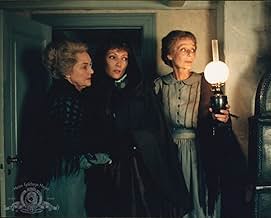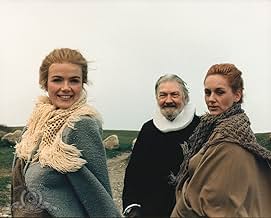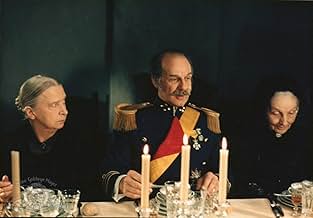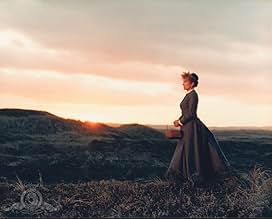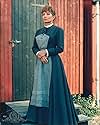During the late 19th century, a strict religious community in a Danish village takes in a French refugee from the Franco-Prussian War as a servant to the late pastor's daughters.During the late 19th century, a strict religious community in a Danish village takes in a French refugee from the Franco-Prussian War as a servant to the late pastor's daughters.During the late 19th century, a strict religious community in a Danish village takes in a French refugee from the Franco-Prussian War as a servant to the late pastor's daughters.
- Director
- Writers
- Stars
- Won 1 Oscar
- 11 wins & 8 nominations total
Stéphane Audran
- Babette Hersant
- (as Stephane Audran)
Jean-Philippe Lafont
- Achille Papin
- (as Jean Philippe Lafont)
Ghita Nørby
- Narrator
- (voice)
Asta Esper Hagen Andersen
- Anna
- (as Asta Esper Andersen)
- Director
- Writers
- All cast & crew
- Production, box office & more at IMDbPro
Featured reviews
It has started quietly. If your are looking for an action-packed movie this is absolutely not the right choice. All characters are slowly depicted on the scene. Stroke after stroke on the scene canvas. None can take away his hands to the priest and so the sisters lifespan devotion can only remain into the village. Philippa and Martina know their destiny, belong only to the village. So when you understand that, you are on the movie scene, in the village that becomes the whole known world in that time. When, no technology can let you imagine anything else than the campaign, the village, the sea. You feel the rhythm of that ancient village's life. Watching the movie in a cold snowy late afternoon can cause you to approach this evening dinner with some sumptuous expectations ...
The final sentence that give a title to Babette's sacrifice far from Paris: An artist is never poor.
Superb photography. Many situations depict portraits and landscapes as they were styled on canvas there, in Jutland, in 18th century.
The final sentence that give a title to Babette's sacrifice far from Paris: An artist is never poor.
Superb photography. Many situations depict portraits and landscapes as they were styled on canvas there, in Jutland, in 18th century.
One evening when I was working in the lab, I developed this intense pang of hunger. I decided to go downstairs to the cafeteria and scrap together a dinner when I noticed a few random folk gathered in front of the adjacent theater. Since the building was usually empty by that hour I couldn't help feeling curious and since I always eavesdrop on conversations I soon discovered that they were showing old films in the theater. So, I bought a few vendor snacks and decided to join them for a viewing. That was one of the best work related decisions I ever made as an undergrad. That movie made me reconsider my second shift job at the lab and check out enrollment into the local culinary art schools. Well, I didn't become a chef but I did abandon biology for a more creative outlet and realized that being home before dinner is an important part of better living. Babette's Feast - a movie that had me reevaluate my life and consider a career change. How many flicks do that? Best movie ever.
This movie is almost unknown, but it is very good. In a lonely Danish town, two old sisters live remembering a far youths, when, due to a strict puritan education, they had to reject happiness. Lonely, then, the live in a dignified austerity, until Babette, who flies from Paris, frightened by the horror of the war, arrives. In few time, she will be able to turn the goodness and love she received when she arrived. A good lottery prize lets her organize a great banquet, following the best rules of French gastronomy. All neighbourhoods are invited (all fanatically puritans). They accept, but they pact to not show any trace of pleasure or enjoyment, as it would be a sin. However, the seductive force of the delicious meal they eat, that they become seduced by the sensuality of French gastronomy. The banquet end in a very felt, though quietly, happiness. The love between humans has awaken. The miracle of rise the human kindness due to the pleasure of the sense has begun. The movie is surprisingly good, but it is not for all tastes. During most of the movie, nothing happens, all is so quiet and so peaceful, that during many minutes, you can only see the life of the inhabitants of the town. But, as the movie develops, it becomes more precious, when Babette wins the lottery prize (after 30min movie), the show begins. The author is able, with a perfect directing, to show us how Babette prepares the banquet, how she mixes all the ingredients with the most wonderful one (Love), all told in a quiet delicious way, with a perfect knowledge of photography and acting. Then, as the banquet goes by, the quality in showing us how the mood of all eaters changes due to the meal, only with first shots, with impressively filmed scenes one after another is simply astonishing. In addition, the tact with the colours and the photography is also superb, almost every scene of the movie is like a picture, so work is involved there. If you are able to admire good cinema and are able to realize that sometimes the way on telling you something rather than what is told is more important, this is your movie. If you happen to like good meals and just love the good gastronomy, probably, you'll feel amused, as most feelings of the movie will be familiar to you. An Oscar totally deserved. The only problem is its slowness at setting up the story, but, I can forgive it (I hope everyone too)
The 1987 Oscar winner for Best Foreign Film is an austere but ultimately joyous fable set on a desolate spit of coastline in northern Denmark, where for sustenance the puritan townsfolk rely first on prayer and afterwards on their daily ration of a thin, brown gruel made from soggy bread crusts and dehydrated flounder. But all that changes with the arrival from Paris of an attractive refugee (the story takes place during the French Revolution) who thanks her benefactors, and tests their strict religious principles, by preparing a sinfully delicious gourmet feast for the entire town. The meal is more than enough to tempt even the most devout ascetic, but of course the dour villagers do their best to look as if they're not enjoying each luxurious mouthful. It's rare these days to find a film so unafraid of simple virtues, without even a trace of malice or cynicism to spoil its bittersweet charm. In the end the gap dividing the villagers' spiritual and earthly appetites is happily bridged, proving again that few things (except perhaps a good movie) are as life embracing as a hearty meal.
Stephane Audran is the eponymous heroine of this beautifully measured study of a small Danish community towards the end of the last century. Two beautiful and musically talented sisters give-up their own prospects of happiness and marriage in order to look-after their ageing father. One day, a French woman, Babette, comes to work for them. After some years she wins the lottery and is determined to do something for the sisters who have taken her in. Her solution is to prepare an exquisite and sumptuous feast, which changes the lives of all those invited. This is a film about human and cultural interaction, reflected in the changing language of the dialogue from Danish to French, and especially between the dutiful sobriety of Protestant northern Europe and the sensuousness of the Catholic south. It is also about human needs, and how warmth and kindness can be expressed and stimulated through the cultivation of the senses. A profoundly uplifting film.
Did you know
- TriviaFirst Danish movie to win an Academy Award for best foreign language film.
- GoofsIn 1871 Babette pays with skilling, which was the currency used at that time; 14 years later, Babette still uses skilling, but Denmark changed the currency in 1875 from skilling to kroner and orer.
- ConnectionsEdited into Eventyret om dansk film 18: Nye perspektiver - 1970-1987 (1996)
- SoundtracksWaltz No. 15 in A-flat major Op. 39
(arranged for orchestra) (uncredited)
Written by Johannes Brahms
Played during the dance hosted by the Royal family
Details
Box office
- Gross US & Canada
- $4,398,938
- Gross worldwide
- $4,637,920
- Runtime
- 1h 43m(103 min)
- Sound mix
- Aspect ratio
- 1.66 : 1
Contribute to this page
Suggest an edit or add missing content




